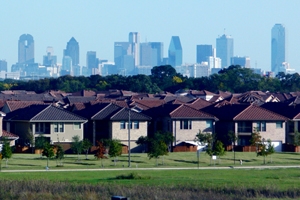Research
Exploring Seismic Shifts in U.S. Communities

The American Communities Project (ACP), a new pioneering initiative bringing together political science, journalism, and academia, seeks to understand why, and what these monumental shifts signify for the nation’s future.
“We’re overwhelmed with information about what is happening in our country, without understanding the reasons behind the changes,” said Dante Chinni, practitioner-in-residence in SPA’s Department of Government and creator and director of the ACP. “The American Communities Project aims to understand and explain the direction the country is moving.”
Fifteen Community Types
The ACP uses a vast array of data, such as election results and consumer polls, to group communities on a host of different demographic dimensions, including income, race, ethnicity, and education. The ACP project has identified 15 types of communities, from "Aging Farmlands" (rural communities with a largely aging and Caucasian population) to "Military Posts" (communities marked by the presence of troops and bases). Chinni’s team will launch a dynamically generated map of the nation, which will plot the community types and provide county-specific statistics.
Having identified these community types helps journalists and political scientists look at data like unemployment figures and voting results to draw conclusions about the impact of changing demographics.
“These places all want and need different things economically, culturally, and politically,” said Chinni. “For example, if you see unemployment rates being disproportionate in military communities right now, it leads to questions about if and how it is connected to the sequester.”
Event Will Explore Political Implications of Shifting Suburbs

Dante Chinni
One area changing quickly, the suburbs, will be the focus of an upcoming symposium entitled “Shifting Suburbs: Changes in the Nation’s Political Fulcrum,” co-hosted by SPA’s Washington Institute for Political Affairs Research (WIPAR).
“The suburbs, especially the urban suburbs, have shifted a lot,” said Chinni, who is working on a front-page piece about Northern Virginia’s suburbs-in-flux for an upcoming edition of the Wall Street Journal. “They are more diverse, more dense, more urbanized, and increasingly Democratic, which has real political implications.”
In addition to Chinni, the September 23 event (watch the live stream) will feature Antoine Yoshinaka from SPA's Department of Government; Elizabeth Williamson, national political reporter for the Washington bureau of the Wall Street Journal; Bill McIntuff, partner and co-founder of national political and public affairs survey research firm Public Opinion Strategies; and Michael Bloomfield, executive vice president and managing director of The Mellman Group, which has provided opinion research and strategic advice to political leaders.
Pushing Ideas in New Research Directions
Chinni hopes to collaborate with academics interested in similar issues “who can look at the data in a different way—sometimes broader, sometimes more specialized—and push some of these ideas in new research directions.”
He also aims to reach students across campus, including the School of Communication. “It’s important that the next generation of journalists understands how complicated the country is, and comes to see it in a more nuanced and accurate way,” he said.
Chinni, a veteran journalist who writes the “Politics Counts” blog for the Wall Street Journal, is also a fellow with SPA’s Center for Congressional and Presidential Studies. He also wrote Our Patchwork Nation: The Surprising Truth about the Real America, which, according to a review by Washington Post columnist E.J. Dionne, is "a wonderful book that takes us way beyond red and blue—while also explaining the social, regional and economic roots of our partisan and ideological color wars."
"Shifting Suburbs: Changes in the Nation’s Political Fulcrum," is free and open to the public and will be held in the Katzen Arts Center's Abramson Family Recital Hall from 10:30 a.m. to 12 p.m. on Sept. 23.

